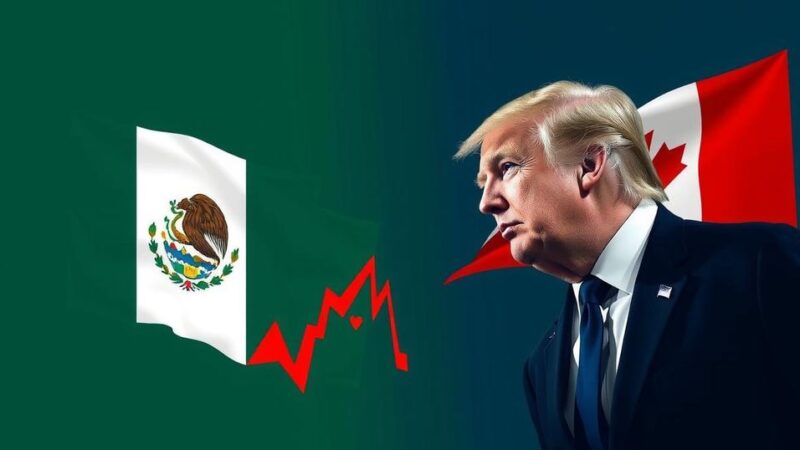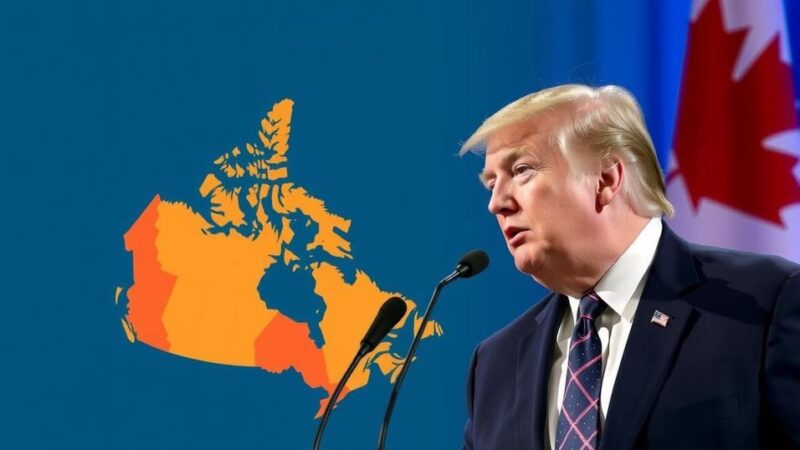President Trump has proposed imposing trade tariffs on imports from Mexico, Canada, and China, which has raised concerns in Europe regarding potential future tariffs affecting their markets. This strategy mirrors his previous use of tariffs as a tool for foreign policy; however, the economic repercussions could significantly impact U.S. consumers and international trade dynamics, particularly for closely connected economies like Canada and the UK.
European businesses are apprehensive regarding the potential impact on their sales in the United States following President Donald Trump’s recent proposal to impose trade tariffs on goods from Mexico, Canada, and China. Historically, Trump has utilized tariffs as a means to achieve foreign policy goals and address national security concerns. His recent accusations against these countries include claims that they contribute to drug trafficking through the supply of chemicals.
In his latest announcement, Trump stated that a 25% tariff would be levied on imports from Mexico and Canada, while China faces a potential 10% increase if it fails to comply with demands outlined by the administration. Although Europe has thus far avoided direct tariffs, concerns remain that European markets, particularly the automotive sector, may become targets in the future, leading to increased economic tension. Investment in shares of companies like Stellantis, Volkswagen, and BMW declined significantly following Trump’s statements, reflecting investor anxiety about potential retaliatory measures and the ripple effects of such tariffs on the broader economy.
As the United Kingdom and Europe consider their positions, a strategic approach may be necessary. The economic interests of the UK should ideally prioritize smoother trade relations with the European Union, while also maintaining valuable dialogues with the United States, especially regarding financial regulations. Prime Minister Keir Starmer appears to be adopting a more assertive stance towards China, which may align with Trump’s views but could also be interpreted as performative rather than indicative of a genuine policy shift.
Trump’s tariffs on imports from neighboring countries could also negatively impact American businesses, as these tariffs typically lead to increased prices for consumers. Those in the automotive industry particularly face vulnerability due to highly intertwined supply chains across the borders. The knock-on effects of these tariffs could have dire consequences not only for American consumers but also for the economies of Canada, Mexico, and China, with potential repercussions on global economic stability.
The topic centers on President Donald Trump’s proposed tariffs aimed at Mexico, Canada, and China, which were articulated through social media posts. This marks a continuation of his 2016 strategy, where tariffs served as leverage in foreign trade negotiations and national security policies. The implications of these tariffs extend beyond the immediate targets, threatening to disrupt global trade and economic relations, particularly for nations allied closely with the United States, such as Canada and European countries. The narrative elaborates on market reactions, economic projections, and geo-political consequences.
In summary, President Trump’s announcement concerning tariffs on Mexican, Canadian, and Chinese goods heralds significant potential disruptions in international trade dynamics. While European markets currently remain unaffected, the looming possibility of being drawn into Trump’s tariff strategies raises concerns among policymakers. The estimated economic impact suggests that U.S. consumers and industries could face substantial additional costs, further complicating an already tense global economic environment.
Original Source: www.theguardian.com






